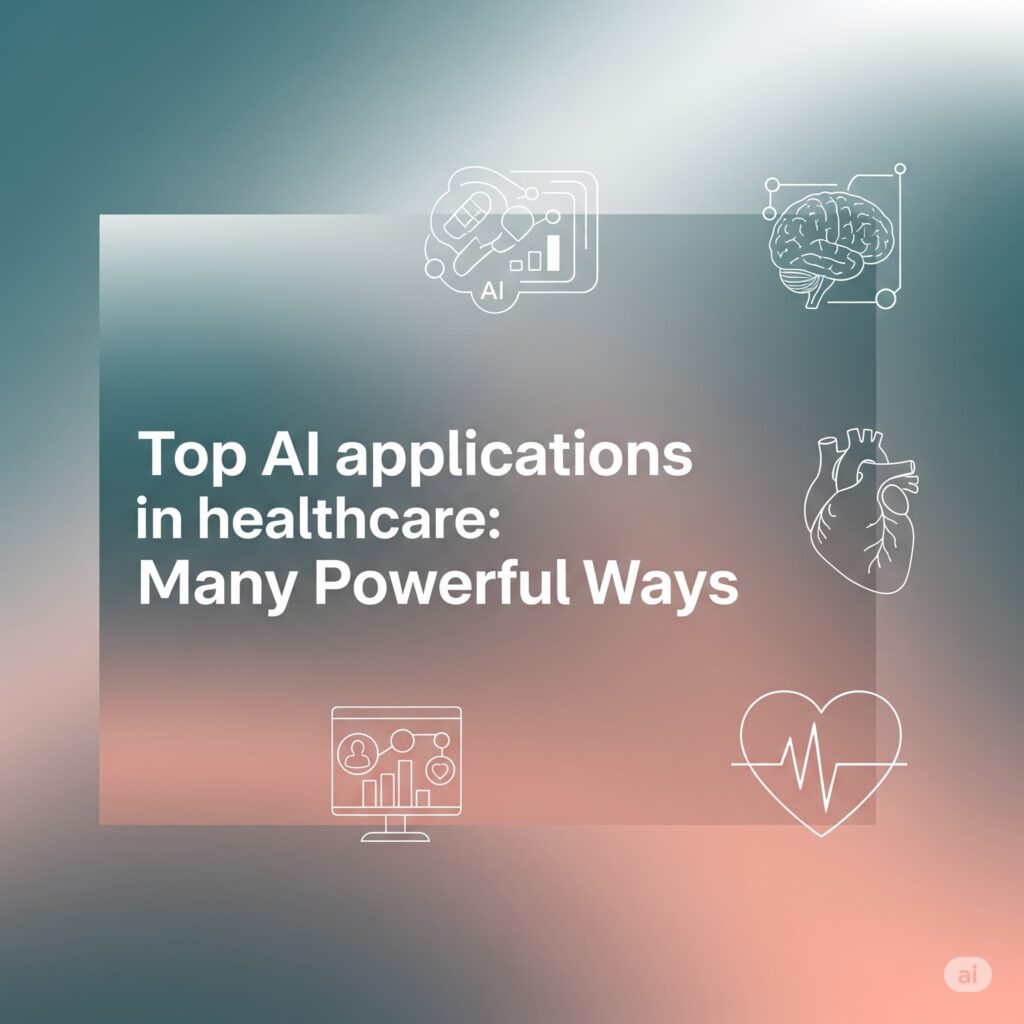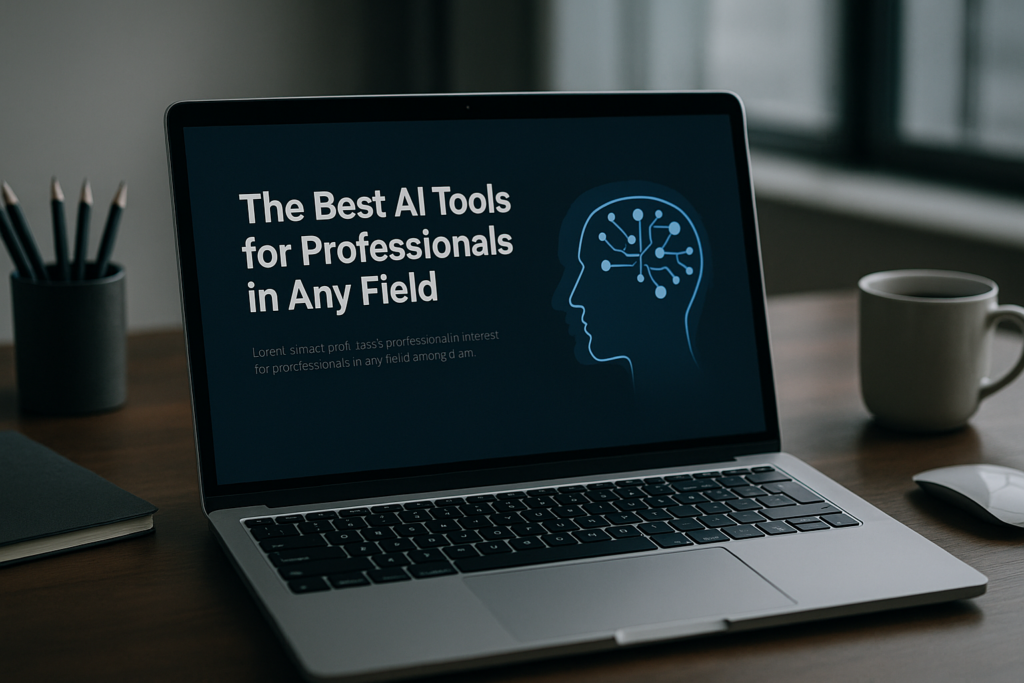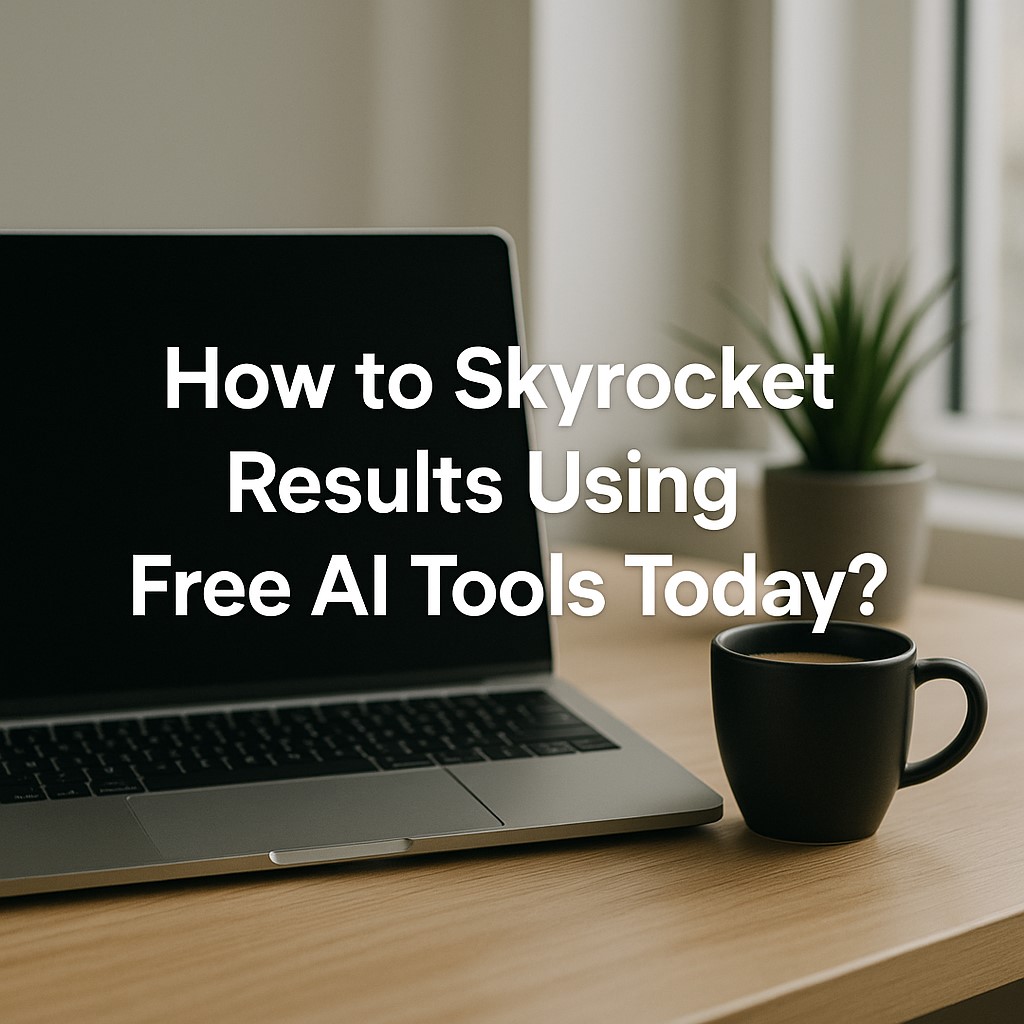Curious how tech is saving lives? Discover the top AI applications in healthcare that help doctors work smarter and patients get better faster.
Artificial intelligence (AI) is doing some pretty cool things in healthcare. From helping doctors spot diseases early to making hospital systems faster, AI is making a big difference. It’s not just a tech trend—it’s saving time, money, and even lives.
When we talk about the Top AI applications in healthcare, we mean the smartest ways AI is being used to help patients and medical teams. These tools can read medical scans, monitor patient health in real-time, and even support mental health. They’re fast, smart, and always learning.
Learning about the Top AI applications in healthcare is important if you’re into tech, science, or just curious about how AI can help people feel better. These tools show us how AI isn’t just for robots or apps—it’s also a huge part of modern medicine.
So if you’ve ever wondered how hospitals get smarter or how doctors make quick, accurate choices, the Top AI applications in healthcare are a great place to start. Let’s dive in and explore how they’re making things better for everyone.
Table of contents
- How do top AI applications in healthcare enhance diagnostics?
- Top AI applications in healthcare for predictive analytics
- Boost clinical decisions with top AI applications in healthcare
- The power of diagnostic tools in top AI applications in healthcare
- Top AI applications in healthcare for better medical imaging
- Top AI applications in healthcare for real-time patient monitoring
- Using top AI applications in healthcare for hospital systems
- Top AI applications in healthcare for smarter EHR management
- Mental health support with top AI applications in healthcare
- Robots in surgery: A look at top AI applications in healthcare
- Managing chronic illness with top AI applications in healthcare
- Are top AI applications in healthcare HIPAA-compliant?
- FAQs: Top AI applications in healthcare
- Conclusion
How do top AI applications in healthcare enhance diagnostics?

Smarter tools, faster answers, and better care. AI is changing how doctors find out what’s wrong with patients. The top AI applications in healthcare are helping hospitals and clinics catch diseases faster and more accurately. Let’s break down how.
AI spots patterns doctors might miss
AI tools can look at tons of data in seconds. They find small changes in X-rays, MRIs, and lab results that humans can easily overlook. This means diseases like cancer or pneumonia get found earlier. Tools like Aidoc and Zebra Medical Vision are already being used in real hospitals to scan medical images quickly. That’s how the top AI applications in healthcare save lives.
AI reduces errors in medical reports
Doctors sometimes miss tiny details when they’re rushed. AI helps by double-checking reports and adding extra info that supports the diagnosis. For example, IBM Watson Health can read patient histories and lab data to suggest the most likely problem. It acts like a smart assistant. The top AI applications in healthcare make sure nothing important gets skipped.
AI gives real-time feedback during tests
Some AI tools work while the test is happening. Like during an ultrasound or endoscopy, AI can guide the doctor by pointing out areas to look at more closely. This helps doctors make better decisions in the moment. It also reduces the time it takes to get answers.
The top AI applications in healthcare are improving how we find health problems every day. They’re fast, smart, and super helpful when doctors need a second set of eyes.
Top AI applications in healthcare for predictive analytics
Using AI to predict health issues before they happen. Predictive analytics is all about looking ahead. With the help of smart AI tools, doctors can now predict diseases and health risks before patients even feel sick. The top AI applications in healthcare are making this possible by studying patterns in health data.
AI tracks your health history
AI can study a person’s medical history, test results, and even lifestyle habits. It then finds patterns that suggest possible future problems, like diabetes or heart disease. Tools like Health Catalyst and Jvion do this in real-time. They warn doctors early, so patients can get help before things get worse. The top AI applications in healthcare are now part of many hospital systems doing this daily.
AI helps hospitals plan better
AI doesn’t just help one person—it helps whole hospitals. By analyzing records of thousands of patients, it predicts who might need care soon. This way, hospitals can prepare for things like flu season or a rise in certain conditions. That means fewer delays and better care for everyone.
The top AI applications in healthcare for predictive analytics are like a smart forecast for health. They spot danger signs before anyone feels them. These tools help doctors act fast and patients stay safe.
Boost clinical decisions with top AI applications in healthcare
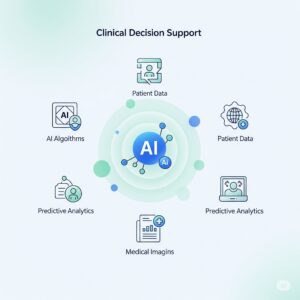
Helping doctors make faster and smarter choices. Doctors make big decisions every day. AI tools are now helping them choose the best options for each patient. The top AI applications in healthcare support doctors by giving them accurate data, quick insights, and helpful suggestions.
AI compares patient data in seconds
When a patient walks in, doctors need to act fast. AI systems like DeepMind and PathAI review medical records, test results, and symptoms in seconds. They match this info with huge medical databases. This helps doctors figure out what’s wrong and what to do next. The top AI applications in healthcare make decision-making quicker and more confident.
AI recommends treatments backed by data
Sometimes there are many ways to treat a health issue. AI can show which treatment has worked best for similar cases. This helps doctors choose wisely. Tools like IBM Watson give real-time suggestions based on current research. With the top AI applications in healthcare, patients get care that’s based on facts, not just guesses.
AI keeps learning from every case
AI doesn’t just stop at helping one patient. It keeps learning from every decision and result. This makes it smarter over time. It helps doctors avoid mistakes and stay updated with the latest medical trends.
Using the top AI applications in healthcare, clinical decisions are faster, safer, and more reliable. It’s like giving every doctor a smart assistant that never gets tired.
The power of diagnostic tools in top AI applications in healthcare
Smart tools that spot problems early and clearly. AI diagnostic tools are changing the way we find and understand diseases. They help doctors get quick and correct answers. The top AI applications in healthcare use these tools to scan medical images, track symptoms, and suggest likely conditions.
AI reads medical images with super speed
One of the coolest things AI can do is read X-rays, MRIs, and CT scans fast. Tools like Lunit and Aidoc check these images and highlight any unusual spots. This helps doctors find issues like lung problems or brain injuries right away. The top AI applications in healthcare often find things that the human eye can miss.
AI combines test results to find patterns
AI also looks at blood tests, scans, and patient history together. It connects the dots and shows possible diagnoses. For example, it can tell if symptoms point to a serious infection or just a common cold. This saves time and helps avoid mistakes. Many hospitals now rely on the top AI applications in healthcare to support these choices.
AI makes second opinions easy
Sometimes, doctors ask for a second opinion. AI can do that instantly. It gives another view, backed by data from thousands of cases. This makes patients feel more confident in the results.
With the help of the top AI applications in healthcare, diagnostics are faster, clearer, and more reliable. It’s like giving doctors high-tech tools to see more and decide better.
Top AI applications in healthcare for better medical imaging
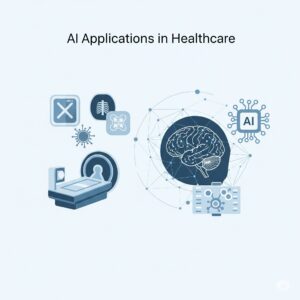
Sharper scans, quicker results, and smarter care. AI is making medical images easier to read and faster to analyze. The top AI applications in healthcare are helping doctors find problems sooner using tools that boost how we see inside the body.
AI makes scans clearer and faster
When doctors look at X-rays, MRIs, or CT scans, they need clear images. AI tools like Arterys and Zebra Medical Vision clean up blurry spots and highlight the important areas. This helps doctors spot issues like tumors or fractures right away. With the top AI applications in healthcare, results come quicker, which means faster treatment.
AI spots details humans might miss
Even trained eyes can miss small signs of trouble. AI systems compare new scans with thousands of past cases. They notice tiny changes that may point to early disease. For example, AI can catch the beginning of lung damage or brain swelling. These features make the top AI applications in healthcare super helpful in busy hospitals.
AI supports better teamwork
AI doesn’t replace doctors—it helps them work better together. Radiologists, surgeons, and nurses all use the same AI tools to stay on the same page. The system gives clear, detailed images everyone can trust. That way, the whole care team can move faster and make safer decisions.
Thanks to the top AI applications in healthcare, medical imaging is now faster, smarter, and more accurate. These tools are making a big difference in how we diagnose and treat patients every day.
Top AI applications in healthcare for real-time patient monitoring
Keeping track of health every second. AI is now watching over patients 24/7. With smart devices and instant updates, doctors can respond faster when something goes wrong. The top AI applications in healthcare help monitor patients in real time, making hospitals safer and more efficient.
AI watches vital signs nonstop
AI systems track heart rate, breathing, blood pressure, and more. Tools like Biofourmis and Current Health alert doctors if something changes too fast or drops too low. This means no delay in care. Even when nurses are busy, AI is always watching. That’s why the top AI applications in healthcare are becoming common in ICUs and emergency rooms.
AI helps manage patients at home
Real-time monitoring doesn’t stop at the hospital. Patients can wear smartwatches or patches that send data straight to doctors. If something looks off, they get a quick alert. This is super helpful for people with heart problems or diabetes. The top AI applications in healthcare let doctors care for patients without them needing to stay in bed all day.
AI gives early warning signs
Sometimes, a small change can mean something big is coming. AI catches these early signs before they turn into emergencies. For example, it can warn of a possible heart attack hours in advance. With that time, doctors can act fast and possibly save lives.
Thanks to the top AI applications in healthcare, real-time monitoring is smarter and faster. It’s like having a digital nurse watching out for you every second.
Using top AI applications in healthcare for hospital systems
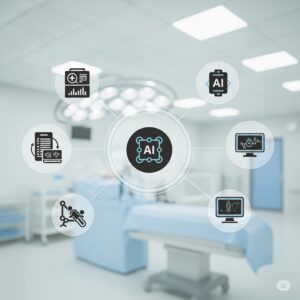
Making hospitals smarter and more organized. AI isn’t just for patients. It also helps hospitals run better. From scheduling to managing beds, the top AI applications in healthcare help staff save time, reduce mistakes, and give better care.
AI organizes patient flow
Hospitals can get very busy, especially in the ER. AI tools like Qventus help track how many patients are coming in and how long they’ll stay. This lets staff plan ahead and avoid long wait times. With the top AI applications in healthcare, patients get seen faster, and staff can focus on what matters.
AI manages hospital resources
Beds, machines, and medicines need to be in the right place at the right time. AI systems check which rooms are free, which tools are in use, and what supplies are running low. This helps prevent delays. The top AI applications in healthcare make sure nothing is wasted and every patient gets what they need.
AI supports smarter staffing
It’s hard to always have the right number of nurses or doctors on shift. AI looks at patterns—like when hospitals get busier—and suggests the best times to add more staff. That way, hospitals stay ready without overworking anyone.
The top AI applications in healthcare are not just about high-tech tools—they help behind the scenes too. They keep hospital systems running smoothly so doctors and nurses can focus on saving lives.
Top AI applications in healthcare for smarter EHR management
Making digital health records easier and faster to use. Electronic Health Records (EHRs) hold everything about a patient’s medical history. But managing them can be slow and messy. That’s where the top AI applications in healthcare come in—they make EHRs quicker to handle and easier to understand.
AI reduces typing and clicks
Doctors spend a lot of time just typing notes. AI tools like Nuance’s Dragon Medical One turn voice into text right away. This means less clicking and more focus on the patient. With the top AI applications in healthcare, doctors can finish records in minutes instead of hours.
AI keeps patient data clean and sorted
Sometimes, EHRs have errors or missing info. AI finds those problems fast. It fills in the blanks, flags confusing details, and keeps everything organized. That way, doctors always get the full picture before treating someone. These smart fixes are a big part of why the top AI applications in healthcare are now used in top hospitals.
AI makes searching easier
Instead of digging through pages of notes, doctors can just ask the AI. For example, “Show me this patient’s past test results,” and it pops up instantly. This saves time and avoids mistakes.
With the top AI applications in healthcare, EHR systems are no longer a burden. They’re now smart helpers that speed things up, cut stress, and improve patient care every day.
Mental health support with top AI applications in healthcare
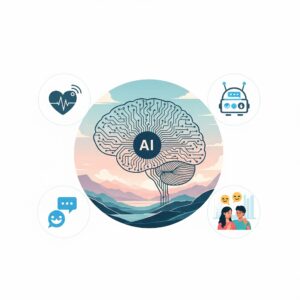
Helping minds feel better with smart tech. Mental health is just as important as physical health. But not everyone can get help right away. That’s why the top AI applications in healthcare now offer real support for people struggling with stress, anxiety, and depression.
AI chats when people need it most
Apps like Woebot and Wysa use AI to talk with users any time of day. These tools ask questions, listen to feelings, and give helpful tips. It’s like texting a friendly robot who cares. These top AI applications in healthcare are great for students who feel overwhelmed but don’t want to talk to someone in person right away.
AI spots early signs of trouble Top AI applications in healthcare
Some AI tools look at how people talk or answer questions. If someone shows signs of sadness or stress over time, the system can alert a real doctor or therapist. This means help can come before things get worse. That’s why more schools and clinics are trying out the top AI applications in healthcare for early mental health care.
AI helps therapists, too
AI doesn’t replace therapists—it helps them. Tools like Spring Health give mental health pros better data about their patients. This way, they can plan the best treatment faster.
With the top AI applications in healthcare, mental health support is becoming easier to reach, more personal, and always available. For many young people, this can make a real difference when they need it most.
Robots in surgery: A look at top AI applications in healthcare
How are AI-powered robots helping doctors in the operating room? Surgery used to be all about the steady hands of a doctor. Today, robots with AI are becoming amazing assistants. They don’t replace surgeons, but they make surgery safer, faster, and more accurate. That’s why many hospitals now rely on the top AI applications in healthcare during operations.
AI-guided precision makes cuts cleaner
Robots like the da Vinci Surgical System use AI to guide tools with super steady hands. These tools can make tiny cuts more precisely than a human. With the help of the top AI applications in healthcare, surgeons can reach hard-to-access areas without damaging nearby tissues.
Real-time data boosts safety Top AI applications in healthcare
AI doesn’t just control the robot’s hands. It also gives live feedback during surgery. It watches the patient’s vitals and warns the doctor if something’s off. This smart tech keeps surgeries safer and helps avoid problems. Many of the top AI applications in healthcare include this real-time monitoring feature.
Faster recovery, smaller scars
Because AI-assisted surgeries are less invasive, patients heal faster. The cuts are smaller, there’s less bleeding, and the scars are tiny. This means less time in the hospital and more time back on your feet.
Thanks to the top AI applications in healthcare, surgical robots are now trusted teammates in operating rooms around the world. They bring calm hands, smart eyes, and a steady focus, making surgery better for everyone involved.
Managing chronic illness with top AI applications in healthcare
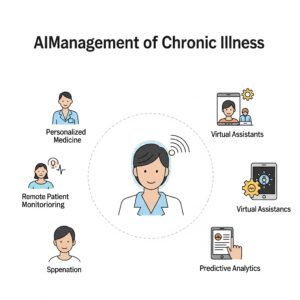
How does AI help people live better with long-term health issues? Living with a chronic illness means dealing with health problems every day. It can be hard to keep track of medicines, symptoms, and doctor visits. The top AI applications in healthcare now make this easier by offering smart tools that help patients manage their conditions better.
AI tracks symptoms and alerts users Top AI applications in healthcare
Apps powered by AI let patients log their symptoms daily. The AI can spot patterns and warn if things might get worse. For example, if someone with diabetes forgets to check their sugar levels, the app might send a reminder. These top AI applications in healthcare help patients stay on top of their health without stress.
AI personalizes treatment plans
No two people are the same, even with the same illness. AI tools analyze lots of data to suggest the best treatment for each patient. Doctors use these insights to adjust medicines or therapies. This makes treatments more effective. That’s why the top AI applications in healthcare are changing how chronic illnesses are managed.
AI improves communication with doctors
Many AI systems also help patients share updates easily with their doctors. Instead of waiting for the next visit, doctors get real-time info. This speeds up decisions and keeps patients safer.
Thanks to the top AI applications in healthcare, managing chronic illness is becoming less overwhelming. AI gives people better control, helps doctors respond faster, and improves daily life for millions.
Are top AI applications in healthcare HIPAA-compliant?
Understanding privacy and safety in healthcare AI. Privacy matters a lot in healthcare. That’s why HIPAA (Health Insurance Portability and Accountability Act) sets rules to protect patients’ information. When hospitals use AI, people want to know if these tools follow HIPAA rules. Let’s explore how the top AI applications in healthcare handle this important issue.
What does HIPAA require from AI tools?
HIPAA makes sure patient data stays safe and private. AI tools used in healthcare must protect this data from leaks or misuse. They also need to let patients know how their data is used. Many of the top AI applications in healthcare include strong security features to meet these HIPAA requirements.
How do AI companies stay compliant?
AI developers work closely with hospitals to keep their systems secure. They use encryption and strict access controls. This means only authorized people can see patient information. The top AI applications in healthcare also undergo regular audits to prove they meet HIPAA standards.
Why does compliance matter for patients?
When AI tools follow HIPAA, patients can trust their information is safe. This trust helps people feel more comfortable using AI for their healthcare needs. That’s why it’s key to choose AI tools known for being HIPAA-compliant.
In summary, the top AI applications in healthcare take HIPAA compliance seriously. They use smart security to protect patient data, making sure privacy stays a top priority in modern medicine.
FAQs: Top AI applications in healthcare
What are top AI applications in healthcare used for?
Top AI applications in healthcare help doctors and nurses work faster and smarter. They read medical data, spot patterns, and even help plan treatments. Many AI tools are trained to support real-time decisions in hospitals and clinics.
Can AI really help in early disease detection?
Yes! AI tools can spot tiny changes in scans or lab results that humans might miss. This helps doctors catch diseases like cancer or diabetes early. That’s why many top AI applications in healthcare focus on early detection.
How do hospitals use AI during emergencies?
Hospitals use AI to predict patient needs, check vitals, and alert staff if something goes wrong. It speeds up decision-making, especially in ERs. Top AI applications in healthcare are built to support these high-pressure situations.
Are top AI applications in healthcare safe to use?
Yes, most AI tools go through testing before hospitals use them. They also follow health rules like HIPAA to protect patient data. Many hospitals trust these tools to improve care and keep information safe.
Do doctors still make the final call when using AI?
Absolutely. AI tools only give suggestions based on data. Doctors always check the results and make the final decision. Even the top AI applications in healthcare are just support tools, not replacements.
Will AI take over healthcare jobs?
No, AI won’t replace doctors or nurses. It just helps them do their jobs better. Many of the top AI applications in healthcare focus on saving time, not replacing people. They work like smart assistants in medical settings.
Conclusion
AI is changing the way healthcare works. From smarter tools to faster care, it’s making a big difference. Many top AI applications help doctors with better decisions. They also make patient care quicker and more accurate.
You’ve now seen how these tools support hospitals, track health in real time, and manage data safely. Top AI applications in healthcare continue to grow and improve. They are becoming a normal part of medical care in many places.
For students like you, learning about this now can be exciting. One day, you might even help build the next big thing. Top AI applications in healthcare aren’t just about tech—they’re about saving lives.

